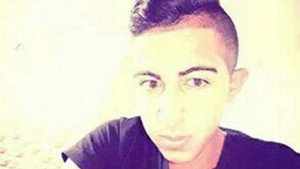Hallel Ariel’s murderer’s behavior was exactly what experts warned of: From a happy and active teen, he became a threatening loner. ‘Everyone has the right to die, and I demand that right to myself,’ he wrote on Facebook. But no one saw this, and no one handled it.
The Israeli demolition teams have already surrounded the home of the Taraireh family in the village of Bani Na’im near Hebron, “taking measurements” ahead of the demolition. The father, Nasser, was arrested and taken for questioning and his work permit has been confiscated. Security forces also confiscated the computer and cell phone of the teen/monster Mohammed Taraireh, who stabbed to death 13-years-old Hallel Ariel in her bed. That is the procedure for deadly attacks.
A study—whose findings will not be released to the public—about the trend of minors from the west Bank who carry out terror attacks, sought to profile them but had a hard time pointing to their common denominator. Over 230 cases were examined over the past nine months in a cooperation (which was neither full nor close) between Israeli experts and the Palestinian security forces. The Palestinians provided information; the Israelis cross-referenced it and wrote down the analysis and segmentation. The conclusions were passed back to the Palestinians in an effort to stop the next attacker, but our side knows well it must trust only in its own abilities.
The information collected about Mohammed Taraireh is right on the money when it comes to profiling the new kind of terrorist. The house that will get demolished is not a tin shack or a tiny crowded apartment of those living in poverty. His family is part of the Palestinian middle cast. And, indeed, one of the conclusions of the study is that attackers are no longer the younger generations of lower-class families, who were easily recruited because of despair or promises of monetary reward, but a growing number of children from “established” families.
In the wake of the study’s findings, teachers in the Palestinians education system were given a task list. For example, they were asked to dedicate special attention to “loners”—teens aged 11-18 who see themselves as “unpopular,” begin to draw inwards and appear to have lost their joie de vivre. These teens miss school and there is a noted drop in their grades and submitted assignments. The teachers were asked to be vigilant to such teens, initiate talks with the “unusual” kids and report it.
The researchers examined social media. When looking at attackers’ pages, they identified sudden changes in their posts, like Taraireh’s Facebook page that has gone through a 180 degrees change. He dropped out of school and went to work at a bakery, came home only every other day, withdrew to his room and spent a lot of time on the computer, browsing ISIS recruiting websites.
His behavior was exactly what the researchers alerted to: From a happy and active teenager, Taraireh became—following the death of his cousin who carried out a vehicular attack against Israelis—to a threat and a loner. “Everyone has the right to die,” he wrote, “and I demand that right to myself.” No one saw this, and no one addressed it.
When Prof. Mohammed Dajani started the “Middle Ground” initiative teaching how to be angry without resulting to violence, his office was vandalized and his car torched, leading him to flee to Washington.
The researchers warn against children and teenagers who post photos of the al-Aqsa mosque on their Facebook page. Taraireh was quoting phrases from the Quran that could have pointed to his intentions. He passionately wrote of “bravery” and “the knife” and in his last post, hours before committing that terrible murder, he uploaded a photo of himself. Without words or explanations—a kind of goodbye.
On his way to carry out his “mission,” the Palestinian minor does not think about the fact their family’s home will be demolished. Suspects who were questioned, both boys and girls, told interrogators they were sure their family would “manage” and that it “won’t be abandoned.”
In their first reaction, Taraireh’s mother and sister tried to hide their shock. In their next response, they already accepted the fact they are going to become homeless and expressed “pride.”
What normally happens in the Palestinian Authority is that the ministry in charge of martyrs starts paying the family a monthly stipend, while the extended family takes the terrorist’s immediate family in.
So far, we haven’t heard a condemnation from Abbas about the horror that took place, and it is frustrating to see how the Palestinian media covered the incident. The headlines focused on the teenager who was shot to death while carrying out a “mission,” he was dubbed a hero, and writers complained of “Israeli incitement.” According to reports on the Palestinian side, Taraireh encountered “difficulties” in his mission. He planned on continuing his murdering spree and killing more Israelis.
ynetnews.com




